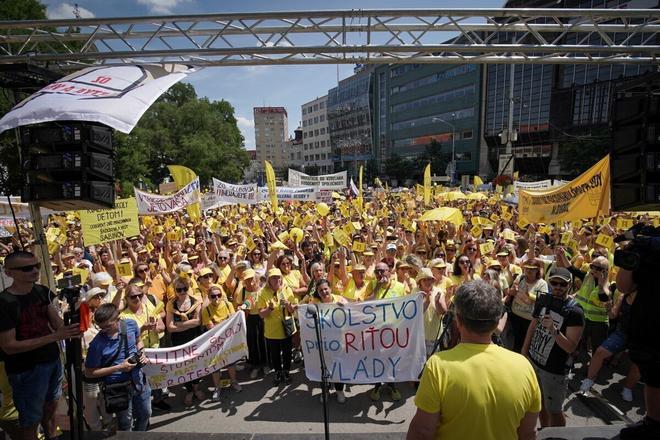The wages of teacher and non-pedagogical workers in education are set to increase.
Prime Minister Eduard Heger announced the aforementioned on July 13, when the government wrapped up negotiations with the trade unions. The agreement comes after a major teachers' protest in mid-June, prior to which the unionists announced a strike alert.
Head of the unions of workers in education and science, Pavel Ondek, now confirmed that as long as the new collective agreement remains in place, there will be no strikes.
"The collective agreement should be signed today," Ondek told the press conference as quoted by the TASR newswire. It will be valid until the end of August 2024.
President of the Confederation of Trade Unions Associations Monika Uhlerová, who was part of the negotiations, said that the ideal negotiation ends with both parties dissatisfied.
"Negotiation is about compromises, both sides having withdrawn from their demands," she said as quoted by TASR.
Real salaries may still go down
Teachers will receive a raise of 10 percent as of January 2023 and 12 percent as of September 2023. Other workers in education will see their salaries go up by 7 percent as of January 2023 and 10 percent as of September 2023.
In addition, there should be a one-off payment of €500. The government says it set aside about one billion euros to cover the costs of increased pay for people in education.
Ondek noted that after September 1, 2023, the starting salaries of teachers in schools and kindergartens, as well as non-pedagogical workers, should be about €250 higher comparied to now. "We shall see what life brings but we also need to look at inflation," Ondek noted as quoted by TASR. Due to inflation, some people may still receive lower real salaries.
"I appreciate that our demands have finally been heard," Education Minister Branislav Gröhling (SaS) wrote in reaction to the news on the salary raise for people working in education for TASR newswire.
Strike alert, street protests and coalition conflict
“Raising teachers’ and non-pedagogical workers’ wages to match rising inflation and growing prices is undoubtedly necessary,” said Ondek during the press conference.
Previously, however, Finance Minister Igor Matovič (OĽaNO) emcumbered the salary raise with a set of tax hikes. Freedom and Solidarity (SaS), which controls the Education Ministry, rejected the proposal, part of the conflict that triggered the current coalition crisis.
On June 15, thousands of teachers and non-pedagogical workers in education took to the streets of the capital city of Bratislava to protest against the government's policy on financing education. Their main demand was higher salaries. They also insisted that inflation was reflected in the higher prices of utilities and groceries, also complicating the basic functioning of schools.
Teachers said that they were ready to go on strike in September if their protests failed to motivate the government to make systemic changes.
Ondek has now said on behalf of the unions of teachers and non-pedagogical workers in education that no strikes will take place until August 2024.


